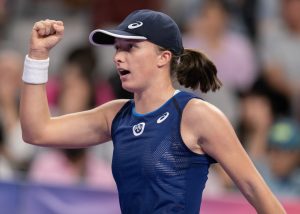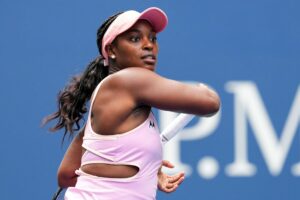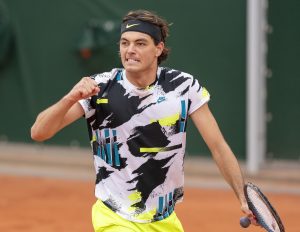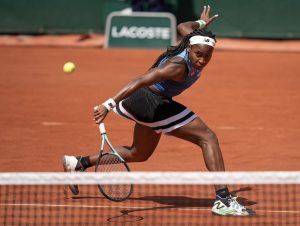As he waved goodbye to an adoring Parisian public on October 28th, 2017, Paul-Henri Mathieu cut an emotional, but satisfied figure. Having lost to Vasek Pospisil in the final round of qualifying for the Paris Masters, “PHM” (as he is otherwise known) could now reflect on his odds-defying career with a tally of four ATP World Tour titles, and a career-high ranking of #12 in the world. Nonetheless, despite his on-court achievements, many would credit his dedication to get back onto court after a complicated knee operation in 2010 as the Frenchman’s greatest success. As a sportsman and character, PHM will be sorely missed on the ATP World Tour. His will and determination made him a fan-favourite at his home Grand Slam, Roland Garros, and around the world. LastWordOnTennis looks back at Mathieu’s career, and examines what made him such an admirable athlete and person.
Early disappointments
Paul-Henri Mathieu made his professional debut in 1999, at the tender age of 17. It took the young Frenchman a while to adapt to the conditions of the professional game. His powerful groundstrokes and athleticism were suited to clay courts, and at Roland Garros in 2002, Mathieu had his first big breakthrough, setting up a fourth round clash with American legend, Andre Agassi. Going into the match, the level of expectation, even from the patriotic French crowd, was one of nervous optimism, as opposed to confidence that Mathieu could pull off an upset. Nonetheless, as would be the case throughout his career, PHM proved the doubters wrong. He stormed to a two-sets-to-love lead, overpowering and outmanoeuvring Agassi at every opportunity. The French crowd’s initial caution had turned into full-blown confidence of a win, but sadly, they would go home disappointed. Following a rain delay and a change of tactics by Agassi, Mathieu squandered his lead to surrender the match in five sets.
Despite his loss, Mathieu had announced himself to the tennis world in style. He would build on his good run at Roland Garros to win back-to-back titles in Lyon and Moscow, later in 2002. His good form earned the young Frenchman a call-up to the French national team in time for the 2002 Davis Cup Final against Russia, held in Paris. With the overall score poised at 2-2, French captain Guy Forget chose Mathieu to contest the deciding singles rubber, against Mikhail Youzhny. It seemed as though it would be the perfect ending to Mathieu’s breakthrough season, and when he moved to within five games of victory, being two-sets-to-love up, the cup was his for the taking. But Mathieu could not see it through.
The Frenchman crumbled under pressure, and surrendered both his lead and the cup to a jubilant Youzhny, whose father had passed away just before the final was due to take place. Once again, Mathieu had been on the receiving end of an incredible comeback.
Moving forward
Despite his devastation following the loss, Mathieu’s success on the ATP World Tour carried on. He reached the third round of the US Open in 2004, his best-ever run at Flushing Meadows, where he squandered a two-set lead again, this time to Sergis Sargsian of Armenia. In 2005, Mathieu had the chance to redeem himself to the French public, as France took on Sweden in his hometown, Strasbourg, in the World Group first round. There was doubt, going into the match, whether Mathieu could perform on the greatest stage. The infamous 2002 final was still raw in the memories of French tennis fans. Unlike in 2002, however, this was PHM’s moment of redemption. Mathieu won his two singles rubbers, including the decisive fifth rubber against then-world #7, Thomas Johansson. In the space of one weekend, Mathieu blew away the memories of his famous collapse in the 2002 final.
What followed was more on-court success for Mathieu. In 2006, he reached the fourth round of the Australian Open and the following year, he won the titles in Casablanca and Gstaad. PHM also reached the fourth round at Wimbledon in 2007, losing to eventual quarterfinalist Andy Roddick. Although the two titles that Mathieu won in 2007 were both on clay, his form throughout the tour showed that he was a jack-of-all-trades, who could adapt his style to different surfaces with ease. He would go on to reach the fourth round at the Australian Open and Roland Garros in 2008, as well as Wimbledon in 2010.
Knee surgery
Mathieu’s reliance on powerful groundstrokes and physical exertion took its toll on the Frenchman’s health. In 2010, he underwent a complex knee surgery, which sidelined him for the next 14 months. Doctors initially doubted whether PHM could return to the ATP World Tour, and as his ranking plummeted, this was a hard time for Mathieu. Nonetheless, much to his and his fans’ relief, Mathieu’s recovery went well. PHM made his comeback on the ATP Challenger Tour in 2012, competing in three tournaments, before he earned a wild card to Roland Garros.
The French crowd welcomed its prodigal son back with open arms. Mathieu stunned the tennis world by coming back from two-sets-to-love down to beat Germany’s Bjorn Phau, ranked 176 places above the Frenchman. After wild celebrations at the end of the match, PHM did not stop there. In the next round, he came up against John Isner, who was ranked at #11, going into the tournament. After 5 hours and 40 minutes out on court, saving seven match points, Mathieu had done it again. Although he succumbed to Marcel Granollers in the next round, Mathieu’s run at Roland Garros 2012 was one of his greatest-ever performances in a tournament. Mathieu had proved his fitness and mental strength, having come back from a serious injury. It appeared as though he had been through Hell and come out stronger, and the French crowd loved him for it.
Mathieu would go on to reach two more finals on the ATP World Tour, in Kitzbühel in 2015 and Montpellier in 2016, but he could not repeat the consistent performances that his fans were used to witnessing. Announcing his retirement from the sport prior to the Paris Masters in Bercy this year, Mathieu said that he would like to spend time with his family. PHM has not, however, ruled out a return to tennis, and with Juan Carlos Ferrero, Ivan Ljubicic, and Andre Agassi all heading into coaching, could we see PHM in the players’ box at some point in the future?
In any case, Paul-Henri Mathieu is a wonderful example of human fortitude. He has overcome setbacks, both on- and off-court, and he continues to be one of France’s most popular and likable tennis players. His career is proof that no challenge is too great, if one has the right attitude and the right people around them.
Main Photo:
Embed from Getty Images






